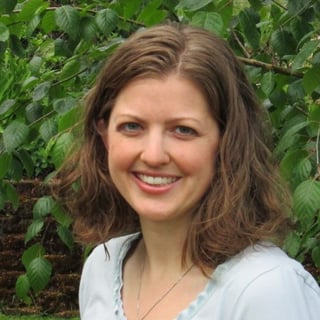 Rhonda Ortiz
Rhonda Ortiz
I love foreign language. I have often walked the aisles of my bookstore's foreign language section, scanning the various titles, fingering phrase books and boxes of vocabulary cards. I love to travel. I own more foreign language dictionaries than I care to admit.
Despite all that, I have never actually learned to speak a second language. Though I have sallied forth into language-learning a number of times, I have quit just as often, always afraid of making a fool of myself and often discouraged by slow progress.
I could make the excuse that I am past my language-learning prime. We know young children absorb language in a way adults cannot. “Babies and children are geniuses until they turn seven, and then there's a systematic decline,” says Dr. Patricia Kuhl of the University of Washington's Institute for Learning and Brain Sciences. “After puberty, we fall off the map. No scientists dispute this curve, but laboratories all over the world are trying to figure out why it works this way.”
But recently something changed for me. Though I am technically “off the map,” I am finally starting to speak French. Slow, broken French. This aspiring bilingual is ecstatic. I can do the dishes, fold the laundry, and rescue the cat from the terrors of an active, animal-loving toddler en français.
Oddly enough, it was postpartum haziness that inspired my renewed interest in language study. I had Baby Blues and Mommy Brain and I realized that mental exercise was what I craved the most. I had my French for Reading Knowledge textbook from college, and I thought, “Why not?” French interested me, though I had forgotten most of it. I began sitting down every day during Benedict's morning nap, prayed for purity of intention, and worked the exercises. The laundry would wait.
To my surprise, I thoroughly enjoyed relearning French. I delighted in it. Unintentionally, almost accidentally, I tapped into a wellspring of wonder about words: the written word, the spoken word, etymologies, definitions, grammar – all of it was fascinating to me. In just a few months I had completed the exercises in the book.
My textbook, helpful as it was, focused solely on reading French. But my interest extended beyond translating poetry and prose. With my husband's support, I began meeting with a tutor, a senior at the local university, to practice other aspects of the language: listening, speaking, and writing.
In my tutor I have found an unexpected friend. She joins us for lunch, chatting with my husband and playing with my son. She bought children's books for us on a recent trip to France. She laughs at my jokes, even when they are not funny. She made the language immediately practical by focusing on topics relating to my life: religion, family, homemaking, and caring for Ben.
Most importantly, her encouragement and lightheartedness have helped me overcome my embarrassment, anxiety, and perfectionism toward speaking French. Now I laugh, rather than fret, over mistakes. I laugh just like my son laughs at his own newly discovered words.
Now, I'm no scientist, but learning to laugh has given me a clue toward articulating an important key difference between children and adult language learners. I'm finding that the more I imitate children, the better I learn.
For my seventeen-month-old son, learning language is sheer fun. Ben loves the reaction he gets from adults when he uses his words. He enjoys the silly songs we sing and word games we play with him, such as this recent favorite:
Me: “What animal says, 'meow'?”
Ben: “Cat!”
Me: “What animal says, 'woof-woof'?”
Ben: “Mama!”
Me: “No, puppy. A puppy says, 'woof-woof.'”
Ben: “Cat! Hee-hee!”
For Ben, speech holds no risks. He does not worry about the accuracy of his accent, whether or not anyone is judging him, or, as in the above case, whether or not he answers questions correctly. He is free from anxiety and so free to learn.
Furthermore, my son enjoys repetition. He reads the same books, works the same puzzles, and touches the same leaf, stick, or blade of grass, again and again. We adults find repetition tedious, and the drills used in language learning we find dull drudgery. But for him, repetition is discovery and practice. And for adult language learners, consistent practice is necessary for retention.
From learning French, I have also learned to empathize when Ben is frustrated by not having the words necessary to communicate. His frustration reveals a deeper desire to be understood, and because of that desire his will is engaged in learning. That same desire motivates students of language.
These attitudes – delight in language itself, fearlessness in trying something new, the desire to practice, and the willingness to grow – are naturally present in Benedict but had been stunted in me. My perpetual need to be right, to never make a mistake, and to always be well thought of hindered my ability to be fearless in taking the risks necessary to speak a new language. Learning French has provided me with an opportunity to confront these fears, and my growth in knowledge – and as a person – has been proportional to the amount I let these fears go.
Best of all, my son benefits. I practice French with Ben frequently, and now he understands simple French sentences and commands. Before, I had mistakenly believed I needed to be perfectly fluent before speaking a second language to him. Now I see that we are learners together.
Rhonda Ortiz is a wife, mother, and aspiring novelist. She blogs at A Naptime Novelist.
Copyright 2012 Rhonda Ortiz
About the Author

Guest
We welcome guest contributors who graciously volunteer their writing for our readers. Please support our guest writers by visiting their sites, purchasing their work, and leaving comments to thank them for sharing their gifts here on CatholicMom.com. To inquire about serving as a guest contributor, contact editor@CatholicMom.com.


.png?width=1806&height=731&name=CatholicMom_hcfm_logo1_pos_871c_2728c%20(002).png)
Comments